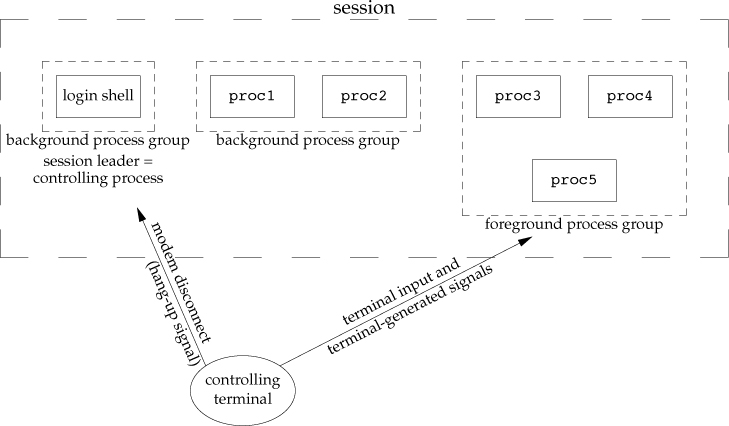
After issuing the following commands:
proc1 | proc2 &
proc3 | proc4 | proc5
You have:

#include <signal.h>
int kill(pid_t pid, int signo);
int raise(int signo);
Both return: 0 if OK, –1 on error
#include <unistd.h>
unsigned int alarm(unsigned int seconds);
Returns: 0 or number of seconds until previously set alarm
int pause(void);
Returns: –1 with errno set to EINTR
alarm(0) cancels the previous alarm if one was set
alarm() & pause() can be used to implement sleep(), but there are many
subtleties
#include "apue.h"
static void sig_alrm(int);
int
main(void)
{
int n;
char line[MAXLINE];
if (signal(SIGALRM, sig_alrm) == SIG_ERR)
err_sys("signal(SIGALRM) error");
alarm(10);
if ((n = read(STDIN_FILENO, line, MAXLINE)) < 0)
err_sys("read error");
alarm(0);
write(STDOUT_FILENO, line, n);
exit(0);
}
static void
sig_alrm(int signo)
{
/* nothing to do, just return to interrupt the read */
}
Two problems:
A race condition: the alarm can be missed between alarm(10) and read()
This doesn’t work if slow system calls are automatically restarted
#include "apue.h"
#include <setjmp.h>
static void sig_alrm(int);
static jmp_buf env_alrm;
int
main(void)
{
int n;
char line[MAXLINE];
if (signal(SIGALRM, sig_alrm) == SIG_ERR)
err_sys("signal(SIGALRM) error");
if (setjmp(env_alrm) != 0)
err_quit("read timeout");
alarm(10);
if ((n = read(STDIN_FILENO, line, MAXLINE)) < 0)
err_sys("read error");
alarm(0);
write(STDOUT_FILENO, line, n);
exit(0);
}
static void
sig_alrm(int signo)
{
longjmp(env_alrm, 1);
}
#include <signal.h>
int sigemptyset(sigset_t *set);
int sigfillset(sigset_t *set);
int sigaddset(sigset_t *set, int signo);
int sigdelset(sigset_t *set, int signo);
All four return: 0 if OK, –1 on error
int sigismember(const sigset_t *set, int signo);
Returns: 1 if true, 0 if false, –1 on error
A possible implementation:
#define sigemptyset(ptr) (*(ptr) = 0)
#define sigfillset(ptr) (*(ptr) = ~(sigset_t)0, 0)
/*
* <signal.h> usually defines NSIG to include signal number 0.
*/
#define SIGBAD(signo) ((signo) <= 0 || (signo) >= NSIG)
int sigaddset(sigset_t *set, int signo)
{
if (SIGBAD(signo)) {
errno = EINVAL;
return(-1);
}
*set |= 1 << (signo - 1); /* turn bit on */
return(0);
}
int sigdelset(sigset_t *set, int signo)
{
if (SIGBAD(signo)) {
errno = EINVAL;
return(-1);
}
*set &= ~(1 << (signo - 1)); /* turn bit off */
return(0);
}
int sigismember(const sigset_t *set, int signo)
{
if (SIGBAD(signo)) {
errno = EINVAL;
return(-1);
}
return((*set & (1 << (signo - 1))) != 0);
}
#include <signal.h>
int sigprocmask(int how, const sigset_t *restrict set,
sigset_t *restrict oset);
how: SIG_BLOCK, SIG_UNBLOCK, or SIG_SETMASK
Returns: 0 if OK, –1 on error
int sigpending(sigset_t *set);
Returns: 0 if OK, –1 on error
Example:
#include "apue.h"
static void sig_quit(int);
int
main(void)
{
sigset_t newmask, oldmask, pendmask;
if (signal(SIGQUIT, sig_quit) == SIG_ERR)
err_sys("can′t catch SIGQUIT");
/*
* Block SIGQUIT and save current signal mask.
*/
sigemptyset(&newmask);
sigaddset(&newmask, SIGQUIT);
if (sigprocmask(SIG_BLOCK, &newmask, &oldmask) < 0)
err_sys("SIG_BLOCK error");
sleep(5); /* SIGQUIT here will remain pending */
if (sigpending(&pendmask) < 0)
err_sys("sigpending error");
if (sigismember(&pendmask, SIGQUIT))
printf("\nSIGQUIT pending\n");
/*
* Restore signal mask which unblocks SIGQUIT.
*/
if (sigprocmask(SIG_SETMASK, &oldmask, NULL) < 0)
err_sys("SIG_SETMASK error");
printf("SIGQUIT unblocked\n");
sleep(5); /* SIGQUIT here will terminate with core file */
exit(0);
}
static void
sig_quit(int signo)
{
printf("caught SIGQUIT\n");
if (signal(SIGQUIT, SIG_DFL) == SIG_ERR)
err_sys("can′t reset SIGQUIT");
}
#include <signal.h>
int sigaction(int signo, const struct sigaction *restrict act,
struct sigaction *restrict oact);
Returns: 0 if OK, –1 on error
struct sigaction {
void (*sa_handler)(int); /* addr of signal handler, */
/* or SIG_IGN, or SIG_DFL */
sigset_t sa_mask; /* additional signals to block */
int sa_flags; /* signal options, Figure 10.16 */
/* alternate handler */
void (*sa_sigaction)(int, siginfo_t *, void *);
};
An implementation of signal() using sigaction:
#include "apue.h"
/* Reliable version of signal(), using POSIX sigaction(). */
Sigfunc *
signal(int signo, Sigfunc *func)
{
struct sigaction act, oact;
act.sa_handler = func;
sigemptyset(&act.sa_mask);
act.sa_flags = 0;
if (signo == SIGALRM) {
#ifdef SA_INTERRUPT
act.sa_flags |= SA_INTERRUPT;
#endif
} else {
act.sa_flags |= SA_RESTART;
}
if (sigaction(signo, &act, &oact) < 0)
return(SIG_ERR);
return(oact.sa_handler);
}
signal_intr() – an alternate version that does not restart system calls:
#include "apue.h"
Sigfunc *
signal_intr(int signo, Sigfunc *func)
{
struct sigaction act, oact;
act.sa_handler = func;
sigemptyset(&act.sa_mask);
act.sa_flags = 0;
#ifdef SA_INTERRUPT
act.sa_flags |= SA_INTERRUPT;
#endif
if (sigaction(signo, &act, &oact) < 0)
return(SIG_ERR);
return(oact.sa_handler);
}
Last updated: 2019–01–28